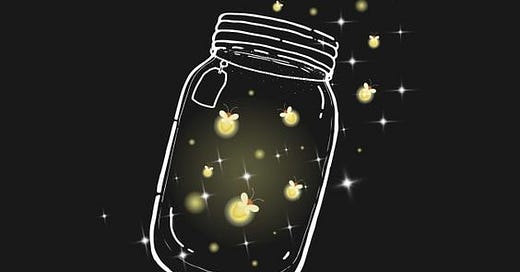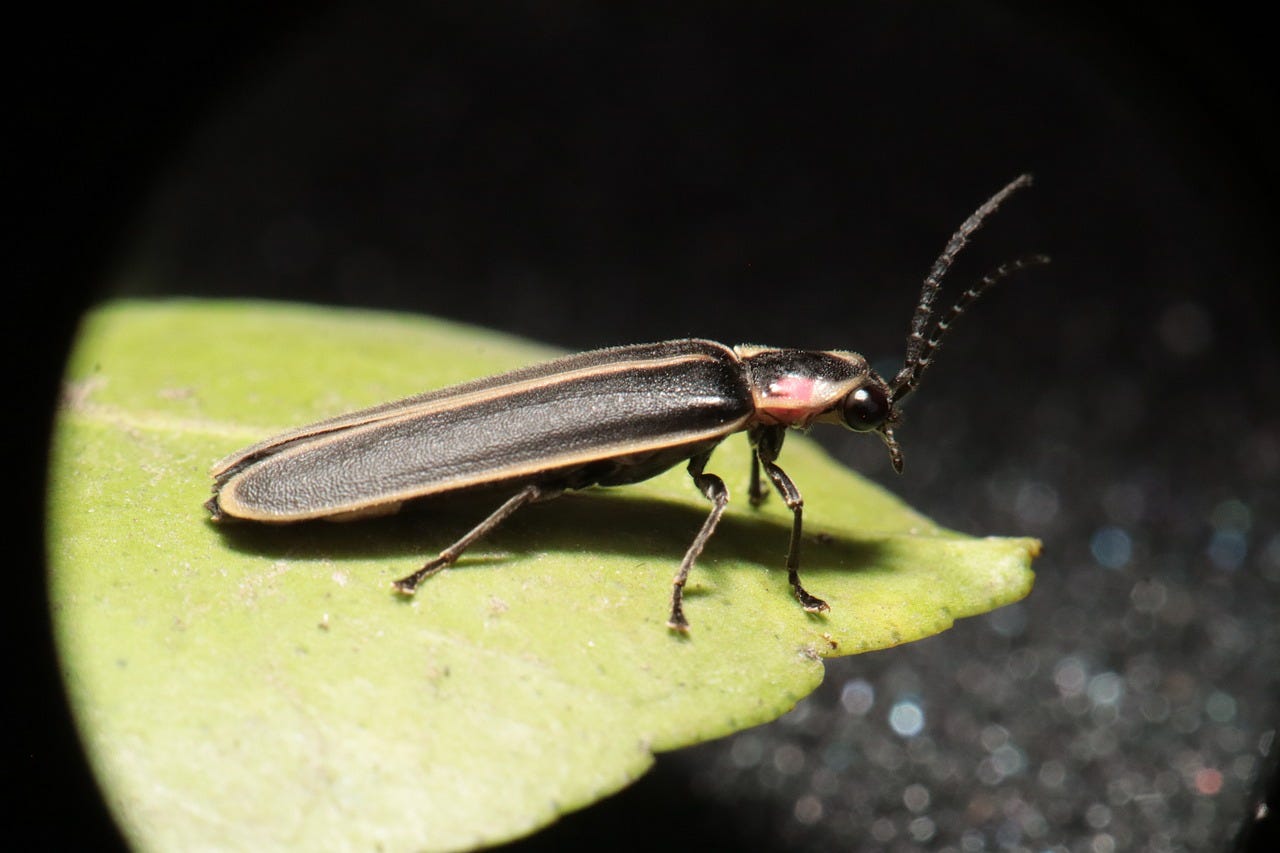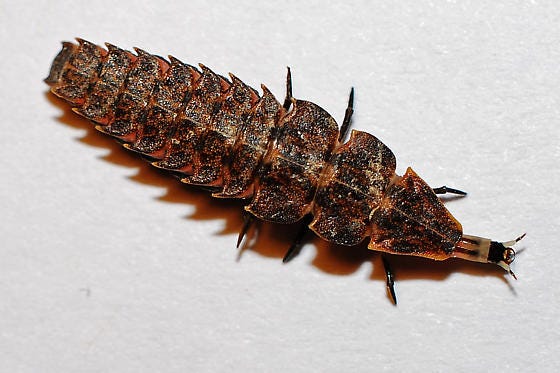I Miss Fireflies
I like to go outside at night to see what's buzzing around. Aside from the gnats and mosquitoes, we actually do have some interesting nightlife, but it's not the same as it was back in the day.
I miss fireflies. As a kid, I'd wear myself out chasing lightning bugs. There were so many of them illuminating the yard in every direction. I'd trap a few in a jar and gaze at them, mesmerized by the magical flashes. When the jar lid opened to release them, the fireflies dashed away to join their companions.
I never thought about it at the time, but the flickers of bioluminescence that entranced me varied. Some lightning bugs would flash twice, while others relied on a single flash. Now, I know that differing patterns aid in mating, defending their territory, and warning off predators.
Want to know how fireflies make their signature glow? National Geographic explains that fireflies have dedicated light organs under their abdomens. "The insects take in oxygen and, inside special cells, combine it with a substance called luciferin to produce light with almost no heat."
Why Are Fireflies Disappearing
As with many insects, fireflies are disappearing due to habitat loss, overuse of pesticides, and light pollution. Their populations are declining around the world. Eighteen species face extinction in the U.S., along with countless others globally.
Habitat loss – According to the species, fireflies prefer forests, fields, moist, marshy areas, or even neighborhoods as long as there’s organic material for their larvae to find food. Unfortunately, overdevelopment of the land has destroyed much of their native habitats.
Pesticides rank right down there with certain politicians – downright evil. Lawn chemicals and broad-spectrum poisons are equal-opportunity killers. They do not discriminate between friend or foe, pollinator or pest. Pesticides do more harm than good. They are nasty stuff. Period.
Voracious firefly larvae live underground or in loose soil and leaf litter. They feed on snails, worms, and slugs, and eating food contaminated by toxic lawn chemicals kills the larvae. Since larvae can take up to two years to develop, fireflies can be exposed to these treatments multiple times.
As adults, fireflies ingest poisons from mosquito and other spray treatments as they shelter in vegetation during the day. Bad news all around.
Firefly Conservation and Research reports, "While no formal studies have been done specifically targeted to the effects of lawn chemicals on fireflies. Two known studies indirectly suggest that these chemicals may be harmful to fireflies and larvae. The first study suggests that lawn chemicals are toxic to insects in the lawn where firefly larvae are found [1]. The other study provides proof that lawn chemicals are very toxic to the food that sustains firefly larvae [2]. Both show that lawn chemicals can have a serious detrimental effect on fireflies throughout all growth stages."
Light Pollution interrupts firefly flash patterns. The little beetles communicate by light to attract mates, defend their territory, and warn off predators. Light from homes, cars, stores, and streetlights may make it difficult for fireflies to signal each other. That affects their mating. One recent study showed that excess light at night reduces the amount of flashing among males, as well as the female response rate.
Fireflies are not the only ones bothered by light pollution. Other night flyers, such as moths and bats, get disoriented from artificial light, too.
What Can We Do?
Got some shrubs and trees in your yard? Fast-growing pine and native trees provide a suitable habitat for many species of fireflies. Leave some natural litter underneath the trees. You'll provide habitat for fireflies and many other invertebrate species looking for a home.
In wooded areas, leave logs to decompose naturally and do not disturb the organic litter accumulating on the ground.
Turn off exterior and garden lights and draw your blinds at night so interior light doesn't brighten your yard too much.
Avoid pesticides and artificial fertilizers! Take advantage of natural pest control and fertilizers.
Let some areas of your yard grow. Fireflies prefer to live in long grasses, and an unmown area may boost their population in your yard.
Talk to your friends and neighbors and ask them to follow these suggestions.
Thanks for reading. I hope you will do what you can for fireflies.
Have a fabulous day!
Greta
References:
1. "Understanding Halofenozide (Mach 2) and Imidacloprid (Merit) Soil Insecticides," by Daniel A Potter. International SportsTurf Institute, Inc., Turfax, Vol. 6 No. 1 (Jan-Feb 1998)
2. "Relative Toxicities of Chemicals to the Earthworm Eisenia foetida," by Brian L.
Roberts and H. Wyman Dorough. Article first published online: 20 Oct 2009.
Environmental Toxicology and Chemistry, Vol. 3, No. 1 (Jan. 1984), pp.
67–78.
~~~~~~~~~~~~~~~~~~~
Dear Reader,
I'd be ever so grateful if you would take a few minutes to recommend Let's Get Our Hands Dirty to your followers on Substack and other social media platforms.
Thank you!
Greta
---------------------------
Let's Get Our Hands Dirty is a reader-supported publication. This post is free as are all my posts. Please subscribe so you can receive notification when new articles are published. I'd love for you to become a part of our nature-loving family. Basic subscriptions are free, but if you sign up for a paid subscription as a love offering, that would be wonderful and greatly appreciated!
Have a fabulous day,
Greta
Please use the buttons below to Like, Comment, Restack, and Share my post on Substack and other social media platforms.
THANK YOU SO MUCH!








This is good stuff. Zap Lanternflies if you can. They are bad news.
We live next to the oldest county park in America, Branch Brook Park in Essex County, NJ, so it has plenty of bushes for Fireflies. They are great fun.
The best way to get rid of mosquitoes is to set up a bat belfry in your property. Bats are your friends.
I told my wife to set one up, and that I want to put the sticker from the Batman movies on it.
She agreed about the belfry, but won't put up with the sticker. She had the same take when I wanted to put a "Carpenters Union Local" sticker next to the artificial beehive on our garage.
The bees living in the garage are Carpenter Bees. I told the Carpenters Union Local President that I could not have "scab bees" in my home, adding, "They can't pay their dues in money, but they can pay them in honey." He agreed.
This is so well done! Factual. With actionable advice. I just shared it on my Facebook page (https://www.facebook.com/diane.porter.102), because this knowledge needs to be universal.